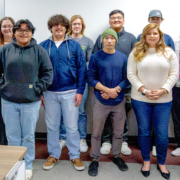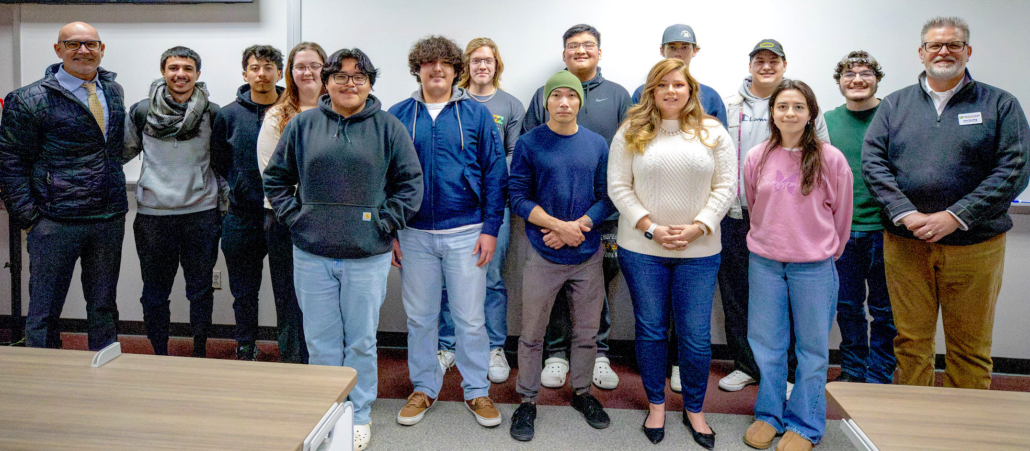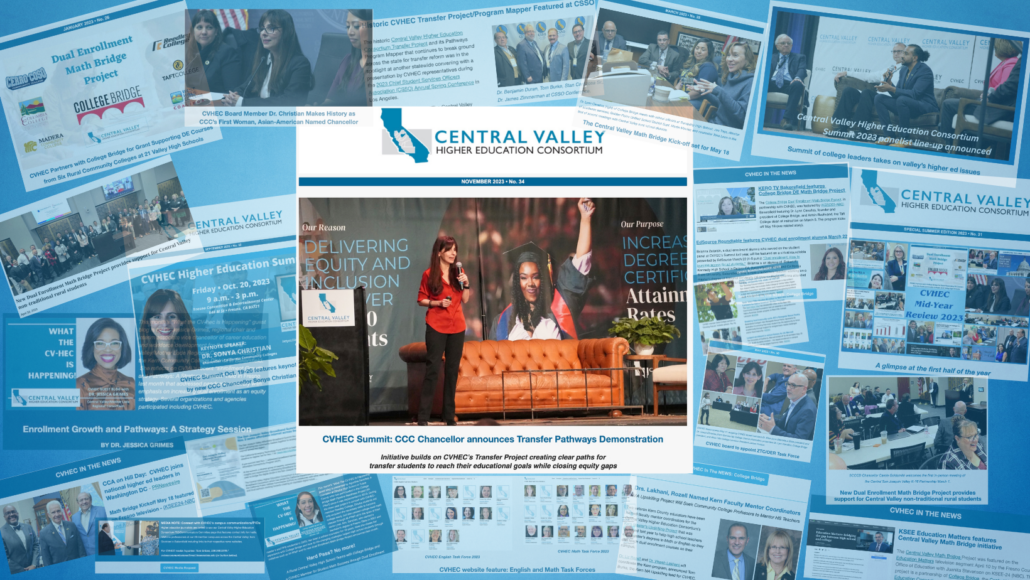
Many strands coming together into one fabric
— a glimpse at the past 12 months
By CVHEC TEAM
(Tom Uribes, Dr. John Spevak and Stan Carrizosa)
The Central Valley Higher Education Consortium completes our 21st year with this 2023 Year-In-Review as seen through the headlines of our monthly e-newsletter, now in its 35th edition. (A special summer edition covers June-August).
While much was accomplished the past 12 months, perhaps our main achievement was a combination of many accomplishments, with the CVHEC team working simultaneously on many strands that come together into one fabric. We have remained committed to building a road to educational and career success for all students, especially those in grades 9 to 14, by continuing to focus on efforts with these major strategies throughout 2023:
- For community college transfer students, we expanded our Central Valley Transfer Project and its Program Pathways Mapper software, inspiring the California Community Colleges to adopt the program as a demonstration project for possible system-wide implementation in the future;
- For high school students, we have encouraged the ongoing growth of dual enrollment, most notably by partnering with College Bridge to help initiate and develop the Central Valley Math Bridge Program involving many of our community college members and their respective feeder high schools as well as expanding our Master’s Upskilling Program initiated two years ago into Kern County;
- We are fostering a Central Valley approach to the understanding of Assembly Bill 1705 through our English and Math Task Forces that are now in full swing with an eye to a productive 2024 and the implementation of this legislation that focuses on student success in math and English.
On a broader state and national scale, we closed the year this month with two major conferences: the Talent Hub Convening in Mobile, Alabama by the CivicLab where we revisited how partnerships between industry and education, working off the same playbook, are vital to cross-collaboration success for both landscapes; and the Complete College America conference in Las Vegas, Nevada where we explored “a clear-eyed vision for leading systems change” in higher education throughout our nation.
See this look back at the CVHEC 2023 story:
CVHEC Partners with College Bridge for Grant Supporting DE Courses from Six Rural Community Colleges at 21 Valley High Schools
In January, we announced that the Dual Enrollment Math Bridge Project — a partnership between the Central Valley Higher Education Consortium, College Bridge and the Rand Corporation — was awarded a five-year $4 million federal grant in late December. The project, with a total budget of $6.7 million, involves six CVHEC community college members providing college-level math classes at 21 rural high schools that will improve and support college readiness for underprepared students in those colleges’ respective service areas beginning next fall. UPDATE: A kickoff for the participants has held in May. The participating CVHEC colleges are: Cerro Coso, Columbia, Madera, Reedley, Taft and West Hills College Coalinga.
‘First of its Kind’ CVHEC Transfer Project Gaining Statewide Interest
The CVHEC Transfer Project with the Program Pathways Mapper that began in 2019 was invited to present at several state and national events as the consortium continues to lead a concentrated effort to increase the number and success of community college transfers from the nine-county region to four-year colleges and universities. The project has grown to nine community colleges and three four-year institutions early research compiled for the project showing a direct correlation between students using the Program Mapper and important student success metrics.
CVHEC Website Feature: Professional Staff Page
CVHEC continued featuring the revamp of its website undertaken in the past year with a new section presented each month including the staff page in January. CVHEC’s 11 team members includes several who are retired from careers dedicated to serving students at their respective institutions of higher education – a service that now continues through CVHEC. All lend their energy, enthusiasm and experience to enhance student success and achievement throughout the region by collaborating with the consortium’s member institutions and the CVHEC Board of Directors.
CVHEC Board Member Dr. Christian Makes History as CCC’s First Woman, Asian-American Named Chancellor
Feb. 23, Dr. Sonya Christian, CVHEC board member who is featured in this summer issue with a vlog, made history when she was appointed as chancellor of the California Community Colleges System — the first Asian-American and the first woman to serve as chancellor for the largest and most diverse system of public higher education in the nation as well as a first-generation college graduate. Chancellor Christian began her term July 1 and for our Mach issue, she is featured in our “What the CVHEC is Happening” Blog discussing her time in the KCCD where she was president of Bakersfield College before serving as KCCD chancellor until her new assignment. In this issue, she is featured in the vlog discussing what lies ahead for the CCC.
Drs. Lakhani, Rozell Named Kern Faculty Mentor Coordinators; MA Upskilling Project Hires Community College Professors to Mentor HS Teachers
Two veteran Kern County educators were named faculty mentor coordinators for the Central Valley Higher Education Consortium’s Kern Master’s Upskilling Project that was launched last year to help high school teachers earn master’s degrees in Math or English so they can teach dual enrollment courses on their campus: Dr. Liz Rozell (math) and Dr. Vikash Lakhani (English). UDPATE: The first cohorts of 21 math students and 25 English students in the Kern Master’s Upskill Program are underway through Fresno Pacific University and National University respectively.
CVHEC Website Feature: Dual Enrollment Page
The February issue’s website feature presented the CVHEC Dual Enrollment Page with the strategies undertaken by CVHEC’s Central Valley Dual Enrollment for Equity and Prosperity (CVDEEP) Task Force established in 2019 to identify and establish the best elements of an intentional and sustainable strategy for dual enrollment. CVDEEP is made up of more than 150 secondary and postsecondary education leaders who gather annually for dual enrollment convenings.
The Central Valley Math Bridge Kick-off set for May 18
In March CVHEC announced that the movement to promote equity and college-readiness in mathematics via dual enrollment courses for underprepared students at rural Central Valley high schools next fall will formally launch May 18 with the Central Valley Math Bridge Kick-off in downtown Fresno presented by co-hosts College Bridge, Central Valley Higher Education Consortium and the Rand Corporation. UPDATE: 95 representatives of the first cohort of 13 Valley high schools in the new Central Valley Math Bridge Program convened with nine community college members for the May 18 kick-off where they began planning the program’s implementation. Rural high schools may still sign up for groundbreaking project that is ‘a model for meaningful dual enrollment pathways that can be replicated statewide.
Recruitment of community college mentors for HS teachers in Kern MA Upskilling Project is underway
The Kern Master’s Upskilling Project announced the recruitment of community college professors to serve as mentors for high school teachers enrolled in the project. The teachers can earn master’s degrees in math or English qualifying them to teach dual enrollment course at their high school campus.
Historic CVHEC Transfer Project/Program Mapper Featured at CSSO
The historic Central Valley Higher Education Consortium Transfer Project and its Pathways Program Mapper continues to break ground across the state for transfer reform with a presentation at another statewide convening: the 2023 Chief Student Services Officers Association (CSSO) Annual Spring Conference March 15 in Los Angeles.
New Dual Enrollment Math Bridge Project provides support for Central Valley non-traditional rural students
(APRIL 20, 2023) — A new state-funded math dual enrollment program will “positively impact” approximately 630 non-traditional students at seven rural high schools next fall through four area community colleges that are members of the Central Valley Higher Education Consortium. The Dual Enrollment (DE) Math Bridge – a partnership between CVHEC, College Bridge, the Fresno-Madera K-16 Collaborative, the Tulare-Kings College & Career Collaborative and CVHEC-member Fresno Pacific University – will provide equitable access to transfer-level math courses with embedded support for high school students who are disproportionately impacted and/or are not traditionally college-bound.
CVHEC leads California delegation at CCA Day on the Hill
(APRIL 20, 2023) — Dr. Benjamin Duran, executive director of the Central Valley Higher Education Consortium, joined Complete College America for its CCA Day on the Hill in Washington, D.C. May 16- 17 where “a network of higher education experts shared strategies and lessons for the implementation of higher ed strategies at scale.” Complete College America is a national non-profit alliance of state and higher education leaders. He met with Valley Congressmember Jim Costa.
CVHEC Summit re-scheduled for October 2023
The Central Valley Higher Education Consortium Higher Education Summit 2023, originally set for May, has been rescheduled for Oct. 20, 2023. The CVHEC Board of Directors will meet the day before the summit (Thursday, Oct. 19).
Recruiting for second cohort of Kern Math/English HS Teachers for Master’s Upskill Program supporting dual enrollment with Kern K-16 Collaborative
Recruitment for the second cohort of Kern high school math teachers to enroll in the Kern Dual Enrollment Teacher Upskilling Pathway for English and Mathematics that qualifies them to teach dual enrollment courses began in April with classes set to begin this August.
FCC: Motherlode ‘Enrollment Growth & Pathways: Strategy Session’ features CCC Chancellor-Select Sonya Christian
Dr. Sonya Christian, California Community College system chancellor, was the guest speaker for the Central Mother Lode Regional Consortium’s “Enrollment Growth & Pathways: A Strategy Session” April 25 hosted by Fresno City College President Robert Pimentel. CVHEC’s Angel Ramirez, operations and finance manager, and Elaine Cash, grants and programs coordinator, presented on the regional dual enrollment efforts taking place across the Central Valley.
CVHEC board to appoint ZTC/OER Task Force Spring board meeting: strategic planning, Transfer Project/Math Bridge convergence
The Central Valley Higher Education Consortium’s new Zero Textbook Costs/Open Educational Resources Task Force will form in the coming months, West Hills College Lemoore President James Preston reported to the CVHEC Board of Directors at its quarterly meeting May 11 in Fresno. The action highlighted a full agenda of information for the board made up of the chancellors, presidents and campus directors of 28 institutions of higher education in the Central Valley’s nine-county region. The next CVHEC board meeting is set for Oct. 19.
Central Valley Math Bridge: kickoff event brings K-16 partners to the table for stronger math programs that would help preserve STEM careers opportunities
Representatives of the first cohort of 13 Valley high schools in the new Central Valley Math Bridge Program convened with nine community college members of the Central Valley Higher Education Consortium May 18 in Fresno to formally launch the program and plan for its implementation. Presented by co-hosts College Bridge, Central Valley Higher Education Consortium and the Rand Corporation, the event drew 95 participants to kickoff the project that promotes equity and college-readiness in mathematics via dual enrollment courses for underprepared students at rural high schools in the region next fall. Dr. Lynn Cevallos, founder and president of College Bridge, warned in her keynote, “The State of Mathematics in California,” that the dire reality of academic disjuncture which has culminated in a pending crisis could see “the doors to STEM careers closing for our students. Fortunately, the Math Bridge project is designed to keep those pathways open,” she said.
Broadband for All Digital Equity and BEAD Planning Workshops CVHEC co-sponsors Broadband Planning Workshop; featured on Radio Bilingual nationwide
The Central Valley Higher Education Consortium was featured nationally on Radio Bilingue April 13 as a co-sponsor of one of 20 Broadband for All Digital Equity and Broadband Equity, Adoption, and Deployment (BEAD) Planning Regional-Local Workshops being held throughout the state by the California Department of Technology. CVHEC Executive Director Benjamín Durán served as a spokesperson at the Merced event held April 14 and was interviewed the day prior for the Spanish-language show Linea Abierta on Radio Bilingüe, the nation’s only daily Spanish-language talk show in public radio.
Merced College milestones: 60th Commencement and first in Los Baños
Merced College observed the 60th anniversary of its Commencement Ceremony held May 26 by presenting a full commencement ceremony at its Los Baños campus May 25 for this first time. The Los Baños ceremony was the latest in a series of investments and initiatives to grow the campus and give Westside students a complete educational experience close to home.
(Published July 19, 2023)
Supreme Court ruling is not the death of Affirmative Action but rather a challenge
Statement by Dr. Benjamín Durán, CVHEC executive director, on the June 29 United States Supreme Court Affirmative Action ruling: ‘in one week — after decades of progress — equity, diversity and access in higher education were simultaneously under attack. However, I offer that this Supreme Court ruling is not the death of Affirmative Action but rather a challenge to renew and reinforce its spirit and outcomes.” See July Director’s Message.
‘Merced Promise Pathway’ streamlines path for Modesto JC, Columbia College student transfer to UC Merced
Students at Modesto Junior College and Columbia College will have increased access to University of California, Merced thanks to an agreement signed July 11 between the university and Yosemite Community College District: the Merced Promise Pathway Memorandum of Understanding (MOU) between the three Central Valley Higher Education Consortium members that provides a clear, streamlined pathway to UC Merced for MJC and Columbia students as well as a variety of supports to help them prepare for life at a four-year university. See Merced Promise Pathway story.
SOFT START program awarded $2.4M for two CVHEC members in ‘Internet for All’ funding
A collaboration that prepares at-risk students and low-income residents for careers in IT-cybersecurity is set to launch this fall by Central Valley Higher Education Consortium members Fresno State and Fresno City College in partnership with the Fresno County Public Library as part of a two-year, $2.4 million federal grant by the National Telecommunications and Information Administration’s Connecting Minority Communities Pilot Program announced in February. Fresno State was one of five minority-serving institutions to receive a portion of over $18.5 million in “Internet for All” funding meant to expand community technology hubs, upgrade classroom technology and increase digital literacy skills as California faces a shortage of about 73,000 cybersecurity professionals. See CVHEC story and KSEE-24 NBC “Education Matters” report.
UPDATE: Registration is available for two new Fresno State SOFT START Cybersecurity cohorts that begin Jan. 31, 2024: the Beginning Certificate session and the first Intermediate Certificate session. FCC certificate programs will be rolled out in fall 2024.
WHAT THE CV-HEC IS HAPPENING BLOG Pt. 2: CCC Chancellor Sonya Christian
For this summer edition of our “What the CV-HEC is Happening” blog, we feature part two of California Community Colleges Chancellor Sonya Christian, Ph.D, with this podcast interview.
See CVHEC CCC Chancellor Blog.
(Published Sept. 7, 2023)
CVHEC Summit Oct. 19-20 features keynote
Dr. Sonya Christian, chancellor of the California Community Colleges, will return “home” Oct. 20 when she delivers the keynote for the Central Valley Higher Education Consortium Summit 2023 in Fresno. With the theme “Student Success through Equity and Inclusion — Thriving in the Central Valley,” the summit will be held from 9 a.m. to 3 p.m. Friday, Oct. 20, at the Fresno Convention Center’s Ernest E. Valdez Exhibit Hall. See summit keynote story.
Open Educational Resources movement launched with $580,180 K-16 grant to CVHEC members
The pioneering Open Educational Resources Improvement Project – a collaboration of Central Valley Higher Education Consortium members and partners – kicks off with a $580,180 state grant as well as a new CVHEC OER Task Force and convening planned for later this fall. CVHEC-member West Hills Community College District recently announced the Fresno-Madera K-16 Collaborative Mini-Grant Award for the groundbreaking initiative that is poised to usher in a new era of educational opportunities by revolutionizing learning, teaching and research materials across the Central Valley. The project is in collaboration with the State Center Community College District and its campuses — Fresno City College, Madera Community College and Reedley College (all consortium members) — and CVHEC. See OER story.
UPDATE: plans for the OER convening and task force announcement will be forthcoming in early 2024.
CVHEC 2022 Mini Grant funds FPU Tri-Alpha Honor Society for first-generation students
A Central Valley Higher Education Consortium Mini-Grant awarded to member Fresno Pacific University earlier this year helped establish a local chapter of the Alpha Alpha Alpha Honor Society (Tri-Alpha) that recognizes and engages first-generation college students. The $6,477 CVHEC grant created undergraduate research fellowships that allows the university to provide research stipends for students and faculty as well as covered student membership fees; two induction ceremonies; and speaker honoria and refreshments for monthly chapter meetings. The CVHEC Mini-Grants, funded by the College Futures Foundation, are awarded to member institutions in support of the consortium’s mission to increase degree attainment rates. See FPU Mini-grant story.
CVHEC website feature: English and Math Task Forces
The Central Valley Higher Education Consortium launches two new web pages this month featuring its two intersegmental task forces consisting of math and English educators representing the 15 community college members in the region that are part of the 28-member consortium. First formed in 2019 under the leadership of Dr. John Spevak, a CVHEC coordinator and a former Merced College vice president, the mission of the English and Math Task Forces is to streamline math and English pathways for students by examining topics and issues of those disciplines and recent legislation as part of CVHEC’s mission: improve certificate and degree completion rates in the nine-county region from San Joaquin to Kern. See the English Task Force and Math Task Force stories.
Tachi Yokut Tribe donates $3 million to West Hills College Lemoore for Native American Studies Program
The Tachi Yokut Tribe donated $3 million to the West Hills Community College Foundation for a comprehensive Native American studies program at West Hills College Lemoore. See Tachi donates story.
UCSF Fresno celebrates new doctors for Central Valley/state
It takes 11 years or more to produce a practicing physician after high school, depending on the specialty. On June 15, UCSF Fresno celebrated the completion of years of training for more than 100 graduates. See UCSF Fresno new doctors story.
WHAT THE CV-HEC IS HAPPENING BLOG (September 2023): Teachers
As students return to classrooms for the fall semester, this month’s “What the CV-HEC is Happening” Blog is a message about the lifelong impact that teachers deliver for their students by Dr. John Spevak, a former teacher who is a vice president-emeritus of Merced College and currently a regional coordinator for CVHEC. See Teachers Blog.
(Published Oct. 10, 2023)
Summit of college leaders takes on valley’s higher ed issues
Several community college chancellors and presidents lead the charge Oct. 20 when the heads of 28 valley colleges and other educators and policy makers convene for the Central Valley Higher Education Consortium Summit 2023 in Fresno that includes a student panel discussing their higher education experiences and a federal education legislative update by U.S. Congressman Jim Costa. CVHEC released its line-up of panelists for the summit which features a keynote address by Dr. Sonya Christian, California Community Colleges chancellor with the theme “Student Success through Equity and Inclusion — Thriving in the Central Valley,” at the Fresno Convention Center’s Ernest E. Valdez Exhibit Hall. See the CVHEC Summit panelists story.
UPDATE: At the Central Valley Higher Education Summit, Chancellor Christian announced an historic new initiative, the Central Valley Transfer Pathways Demonstration Project, in a partnership with and modeled after CVHEC’s Transfer Project.
CVHEC Math Task Force meets in-person Oct. 13 for AB 1705 follow-up
With two convenings this month, the Central Valley Higher Education Consortium Math Task Force is tackling questions regarding California Assembly Bill 1705 requiring that California’s community colleges expand their efforts to enroll and support students in transfer-level math courses in the face of implementation deadlines looming in 2024. In partnership with the California Community College Chancellor’s Office and the Charles A. Dana Center at the University of Texas at Austin, CVHEC presents a virtual sessions Oct. 6 to addressing areas of confusion regarding the bill and its implementation and an in-person session, “AB1705 Student Success Workshop,” Oct. 13 to explore how to best support students within the framework of AB1705 — a follow up to AB 705, previous legislation that fundamentally reshaped placement and remediation at the community colleges. See MTF AB1705 story.
Historic Transfer Project spurs statewide movement to increase transfer rates
As we enter the third phase of the Central Valley Transfer Project, we are pleased to report great progress has been made ranging from its infancy two years ago to nationwide interest — including possible expansion into another region of California in the near future — as our team is invited regularly to present at state and national conferences as well as at the Central Valley Higher Education Consortium’s 2023 Summit Oct. 20. Originally born out of dissatisfaction with Central Valley community college transfer rates to University of California, Merced, this effort has spurred a statewide movement at multiple levels to increase the number of successful community college transfers to four-year institutions with the Program Pathway Mapper software and laid the groundwork for the California Community Colleges’ Central Valley Transfer Pathways Demonstration Project announced at the summit. See Transfer Project update story.
WHAT THE CV-HEC IS HAPPENING BLOG: Master’s Upskill Program Success Story
Sanger West High School teacher JADE MARTÍNEZ recounts road to a post-bac degree and her first dual enrollment class. See Master’s Upskill blog.
Reedley and Merced Colleges host Math Bridge orientation for feeder high schools
Central Valley Higher Education Consortium members Merced and Reedley community colleges hosted high school math educators and administrators from their respective service area schools Sept. 21 for an orientation about the Central Valley Math Bridge Program that is now in full swing. See Math Bridge story.
(Published Nov. 6, 2023)
CVHEC Summit leaves myriad of takeaways for participants
For Araceli Tilley, an alumna of Merced College, the Program Pathway Mapper used by the Central Valley Higher Education Consortium Transfer Project proved to be not only useful for her transfer to UC Merced in fall 2022, it provided her an easy way to map her college courses for her final two years of college at UC Merced that is leading up to graduation in May 2024 with a degree in psychology. Araceli shared her experiences on the student panel at the Central Valley Higher Education Consortium Summit 2023 held in Fresno Oct. 20 where the breadth and depth of CVHEC activities such as the Transfer Project were showcased. Joined by four other students who shared their experiences in activities CVHEC has sponsored and how much their success could be attributed to those initiatives, Araceli’s remarks at the summit “earned” her a trip with the CVHEC team to share her transfer experiences statewide. Presented by CVHEC and sponsored by the College Futures Foundation, the summit attracted 184 higher education officials and educators, legislators and partner representatives for a full day of discourse surrounding Dual Enrollment, Transfers, Math Pathways and Open Educational Resources with several panels introduced and moderated by CVHEC board members. See CVHEC Summit 2023 story and photo gallery.
CCC Chancellor announces Transfer Pathways Demonstration at CVHEC Summit
The California Community College Chancellor’s Office will launch a new initiative, the Central Valley Transfer Pathways Demonstration Project, Chancellor Sonya Christian announced at the 2023 Central Valley Higher Education Summit in Fresno Oct. 20. In a partnership with the Central Valley Higher Education Consortium, the CV Transfer Pathways — modeled after CVHEC’s Transfer Project — entails developing and publishing 2 + 2 transfer pathways using the Program Pathways Mapper software to clarify the path to four-year colleges for transfer students as well as for campus staff in creating clear paths for transfer students to reach their educational goals while closing equity gaps. See the CCC Chancellor Transfer Announcement story.
Math Task Force begins discussion of AB1705 implementation – Nov. 17 next
With an eye towards ensuring the success rates of their students enrolled in corequisites to gateway math courses, community college members of the Central Valley Higher Education Consortium Math Task Force kicked off a series of convenings in October to begin preparing for implementation of Assembly Bill 1705 in the 2024-25 academic year. CVHEC announced that follow up meetings are set for Nov. 17 and Jan. 26 to continue a year-long discussion of ideas and options with the task force members and other educators in an ongoing quest for equitable mathematics under AB705 and AB1705. See Math Task Force AB1705 covenings summary story.
WHAT THE CV-HEC IS HAPPENING BLOG: Expanding the Reach of the Central Valley Math Bridge
College Bridge Vice President Owynn Lancaster updates the Math Bridge project and, after successful College Orientation meetings in September, the College Bridge team has been darting up and down the San Joaquin Valley meeting with interested feeder highs schools to onboard and launch them for the coming academic year’s CV Math Bridge Project. See Math Bridge update blog.
The San Joaquin Valley Broadband Summit Nov. 9 seeks affordable internet across the region
The San Joaquin Valley Affordable Broadband Summit Nov. 9 will bring key community leaders together to strategize for the adoption of affordable internet across the region. The California Emerging Technology Fund (CETF) is hosting the virtual summit that includes a pre-summit Nov. 1 to address broadband barriers, resources and solutions such as the Affordable Connectivity Program (ACP). At the summit, a diverse group of experts, community leaders, and advocates will share their insights and experiences in addressing Broadband Access in the San Joaquin Valley as they seek to bridge the digital divide in the San Joaquin Valley. See Broadband Summit story.
Comcast pledges $100,000 in scholarships to 5 CVHEC CC members
Comcast California presented a $100,000 donation to five Central Valley Higher Education Consortium-member community colleges ($20k each) to support the next generation of students eager to pursue careers in Science, Technology, Engineering, Arts and Mathematics (STEAM): Fresno City College, Clovis Community College, Madera College and Reedley College all in the State Center Community College District and College of the Sequoias. See Comcast STEAM story.
Community College CEOs first caucus: area state legislators address policy issues
The newly-formed Central Valley Community College CEO Caucus held its first convening Oct. 26 with valley legislators to discuss a variety of policy issues facing community colleges. The CVCCCEO Policy Summit and Legislator Convening, which brought together Central Valley state legislators, chancellors and presidents, was hosted at Madera Community College by President Ángel Reyna and led by Merced College President Chris Vitelli, chair of the Central Valley Community College CEO Caucus, and West Hills Community College District Chancellor Kristin Clark, board chair for the Central Valley Higher Education Consortium. See CVCCCEO Caucus story.
KCCD receives ACCT 2023 Pacific Region Equity Award
The Kern Community College District was awarded the 2023 Pacific Region Equity Award from the Association of Community College Trustees (ACCT) at ACCT’s annual conference in Las Vegas, Nevada last month. ACCT is an organization representing more than 6,500 community college trustees throughout the United States. See the KCCD equity award story.
CVHEC In The News 2023: Affirmative Action OP ED
https://cvhec.org/cvhec-in-the-news-affirmative-action-oped-fresno-bee/
Following the historic Supreme Court June 29 decision that severely limited, if not effectively ended, the use of affirmative action in college admissions, Central Valley Higher Education Consortium Executive Director Benjamín Durán wrote of his reaction and that of many colleagues, family and friends in his Director’s Message for the CVHEC summer newsletter edition. Dr. Durán’s message also served as the basis for this op-ed column that was published in the Valley Voices section of The Fresno Bee Opinion page July 24.
CVHEC In The News 2023: Bee panel examining decline of Latino higher ed enrollment features CVHEC leader
Dr. Benjamín Durán, executive director, of the Central Valley Higher Education Consortium, will participate on a virtual panel presented Nov. 8 (6-7 p.m.) by The Fresno Bee’s La Abeja staff, “Central Valley Latinos and higher education completion: Is there a growing gap?” The hour-long panel, presented in three 20-minute breakouts, features state and Central Valley education leaders examining the barriers to Latino student success and opportunities available. Dr. Duran will be joined by Michele Siqueiros, president of the Campaign for College Opportunity as well as Olga Rodríguez, director of the Public Policy Institute of California Higher Education Center who recently presented at the CVHEC summit in Fresno, and Carlos Nevarez, interim provost and vice president of academic affairs at Sacramento State. Fresno State students Crystal Navarro and Joseph Aquino also will discuss their experiences. See story.
CVHEC In The News 2023: CETF helps Planada establish digital community
Together with Comcast, California Emerging Technology Fund provided a $15,000 grant for the Planada Elementary School District to replace 3 laptop carts and purchase 40 Chromebooks for their students. Dr. Benjamín Durán, executive director, of the Central Valley Higher Education Consortium and Merced College president-emeritus, returned to his hometown for the presentation. See story.
CVHEC In The News 2023: Valley college leaders unveil plan to increase university transfers
The recent Central Valley Higher Education Summit and announcement of the California Community College Central Valley Transfer Pathways Demonstration Project, by Chancellor Sonya Christian was featured by KVPR Radio and GV Wire. See story
(Published Dec. 20, 2023)
Happy Holidays from CVHEC!
CVHEC’s Year-In-Review 2023
“The CVHEC Way to Math Success — Implementing AB1705” – Jan. 26 convening set
WHAT THE CV-HEC IS HAPPENING BLOG (September 2023): Gift of Math
Merced College: DR. BENJAMÍN T. DURÁN BUSINESS RESOURCE CENTER
Fresno Bee panel: “Central Valley Latinos and higher education completion: Is there a growing gap?”
New CVHEC board members: Bloomberg named Kern CCD chancellor; Sanders is Modesto Junior College president
CVHEC takes unified Central Valley voice to national/state higher ed conferences
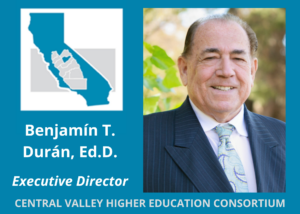

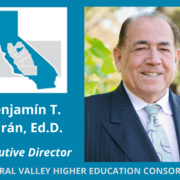
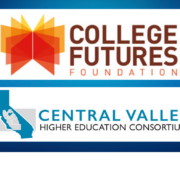
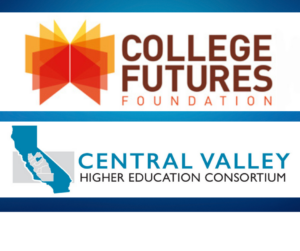

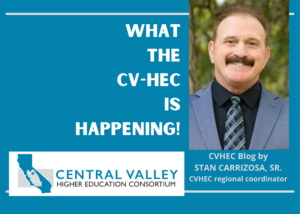
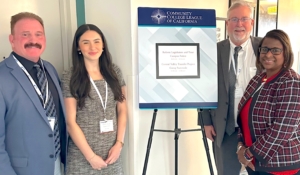
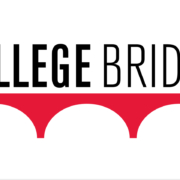
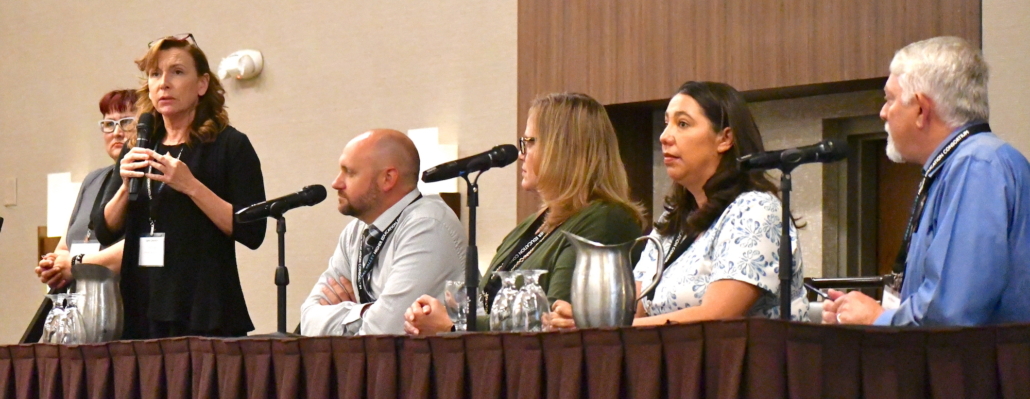
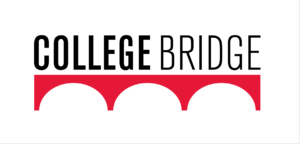
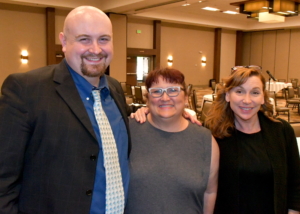

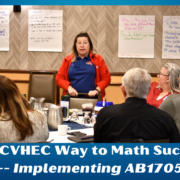
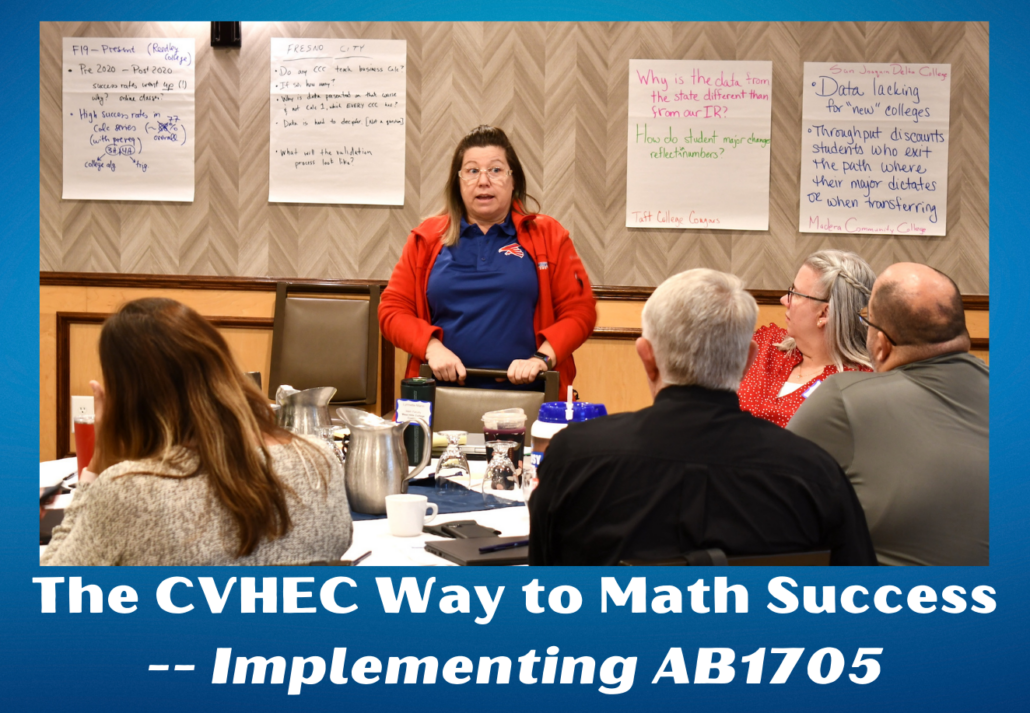
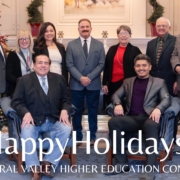
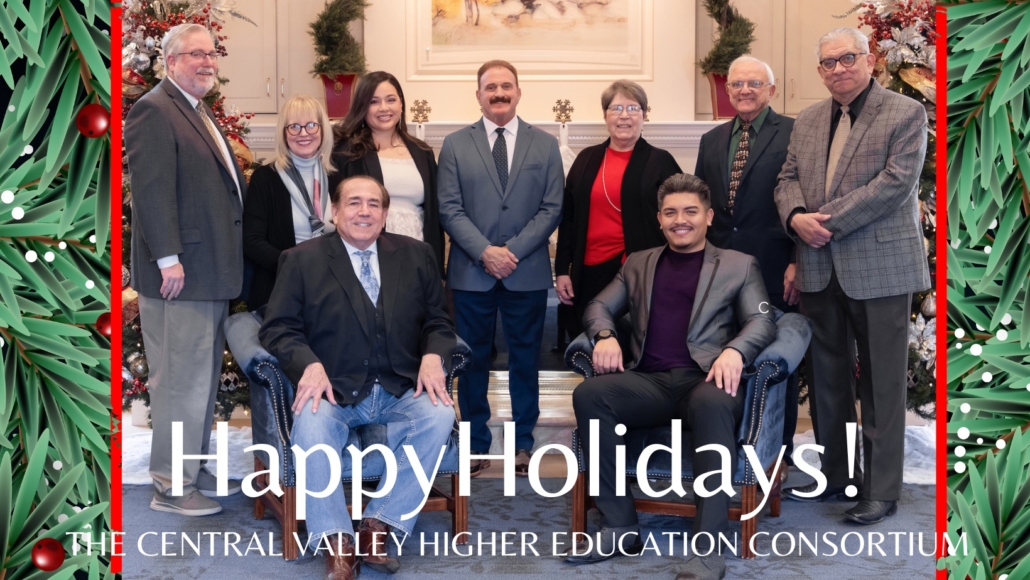
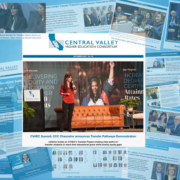

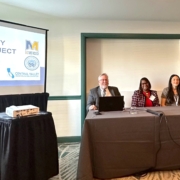
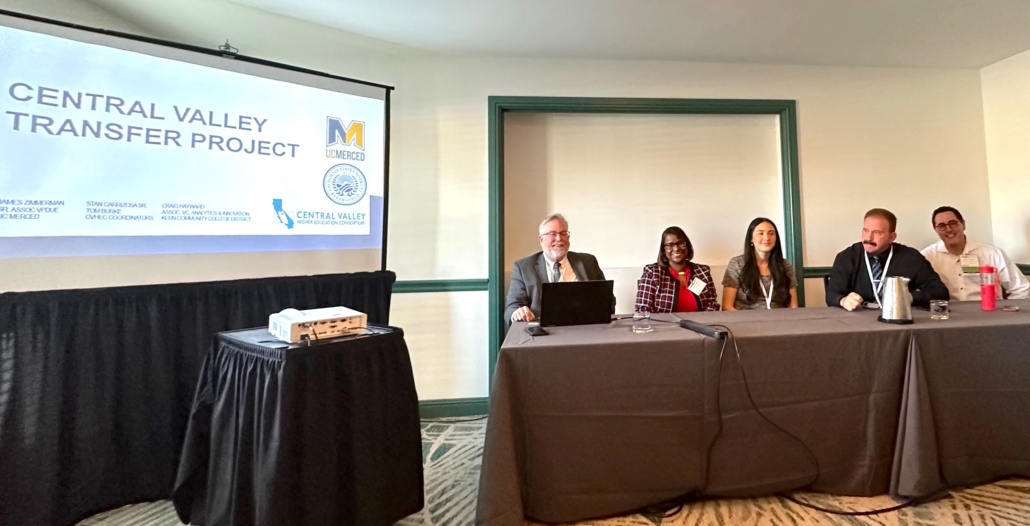
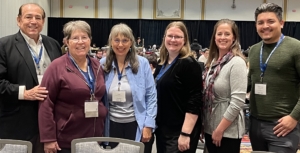
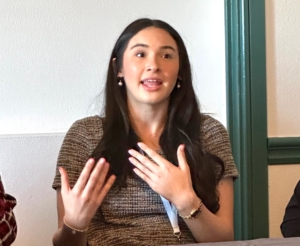 At the CCLC conference last month, the CVHEC Transfer Project once again presented an update on the historic the California Community Colleges demonstration project.
At the CCLC conference last month, the CVHEC Transfer Project once again presented an update on the historic the California Community Colleges demonstration project.